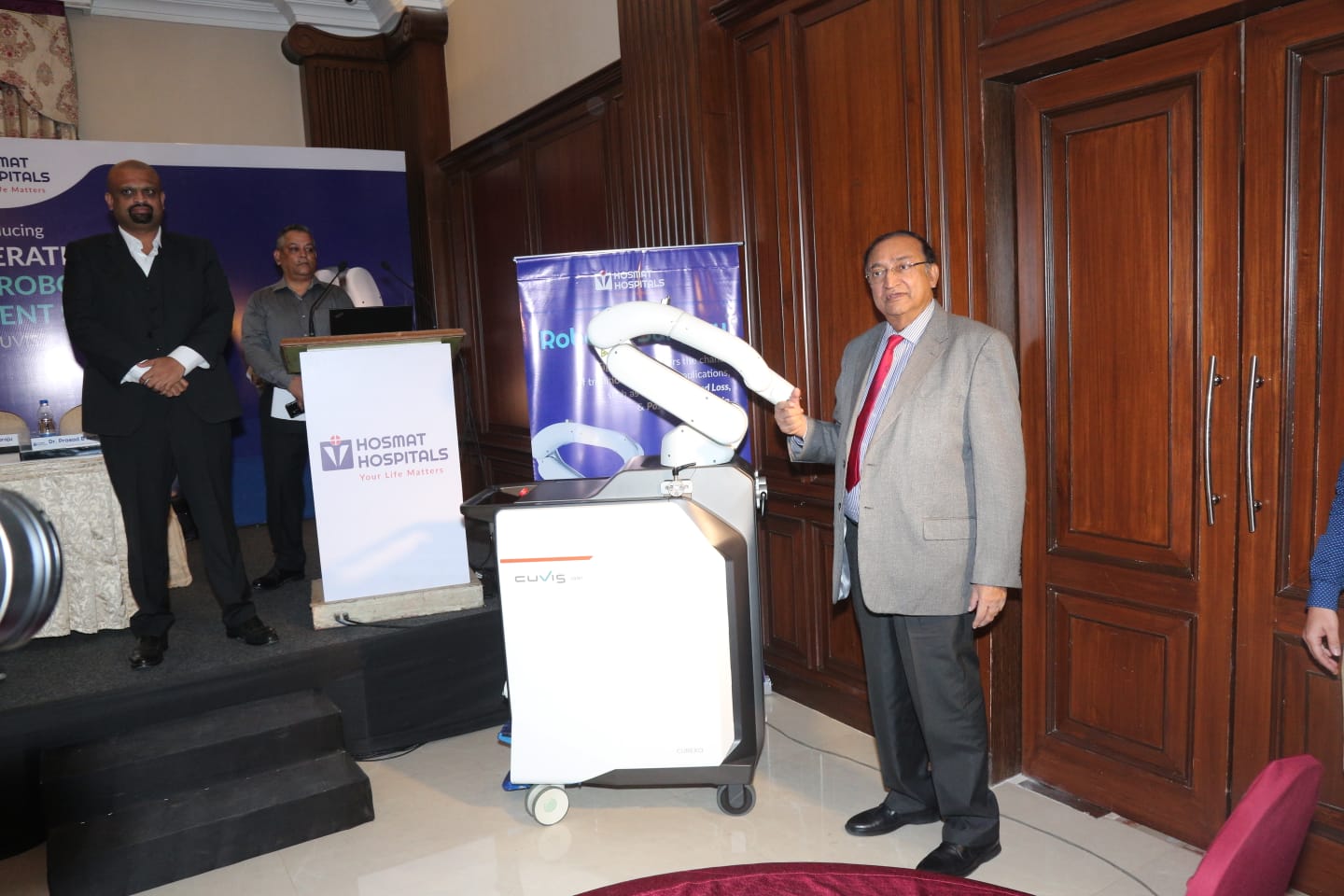Bengaluru India 28 November 2022– HOSMAT Hospitals today announced the inclusion of a sophisticated Ingenious 3rd generation Robotic Surgery unit, in their Magrath Road Hospital, which is the 2nd hospital in Karnataka to have this latest automated robotic system.
After the advent of robotic technology in abdominal and Pelvic surgeries, robotic surgery in joint replacement has come of age with its highly accurate and precision technique. This 3rd generation of CUVIS Robotic units has been in use internationally, including in INDIA, for the last 2 years. The ROBOTIC unit with the orthopaedic surgeon, provides a high degree of precision, with very minimal removal of bone. The post-operative recovery is very smooth with much less pain and bending of the knee as compared to traditional knee replacement.
Knee replacement, also called knee arthroplasty, is a surgical procedure to resurface a knee damaged by arthritis of the knee bones. Two of the knee bone surfaces of the knee are replaced by very strong plastic called high-density polyethene, which is the knee cap bone and the upper end of the leg bone, while the thigh bone is lined by a special metal called cobalt chrome which is nonmagnetic (MRI safe).
This knee replacement may be considered for someone who has arthritis or knee damage due to an old injury or ageing causing a lot of pain while walking or climbing steps showing no improvement on non-surgical treatment and the day-to-day activity is restricted.
Various types of arthritis may affect the knee joint. Osteoarthritis: which is more common is a degenerative joint disease, that affects mostly middle-aged people who are overweight and also people who have side wards bent knees called bow legs and older people above 60 years. Rheumatoid arthritis can cause more severe damage at a younger age. Traumatic arthritis: arthritis due to an old injury, Arthritis causes the breakdown and wear & Tear of the joint surface and loss of cartilage in the knees.
The 3D CT scan images preoperatively are fed into the robotic system through a pen drive. This gives real-time detailed anatomy of the patient’s knee This“EYES” of the ROBOTIC unit located above the Knee constantly assists the surgeon, with the highly accurate replacement operation by providing assistance through its advanced computer system. This relays precise information about your knee, via a GPS-type device that communicates and relays precise information about your knee to a robotics-assisted handheld device used by the surgeon during the procedure. Hence by collecting patient-specific knee spatial information before the surgery, the surgeon is able to establish extensive data for the robotics-assisted hand device, to assist the surgeon in trimming the damaged surfaces of your knee, balancing your joint, and positioning the implant with accuracy and precision, Bow legs and side bent knees are made straight.
The aim of Knee replacement surgery is to cure walking pain, make the patient much more active, to climb 2 floors easily. The patient can stand for over 1 hour to cooking and go to the office. With the latest American implants –Meril Gold the patient can sit cross-legged on the floor after a few months and has a long life of the replacement.
Speaking on this landmark moment Dr Thomas Chandy Chief of Orthopaedics and Arthroplasty who has 35 Years of experience in knee and hip replacement is quite enthusiastic about the robotic system. He recognizes the higher precision and accuracy with lesser bone loss to trim the surfaces of the three bones of the knee joint. He is also impressed by the ability to start walking the next day with much less pain and faster knee bending.





